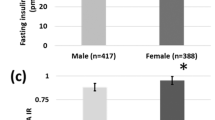Summary
It has been assumed that the incidence of congenital malformations in infants of diabetic women is higher than in infants of healthy, non diabetic mothers. Little is known of the etiology and mechanism of action that causes these anomalies, as well as which of them are more common in offspring of mothers with diabetes mellitus. Two groups of women were studied: one of mothers of mongoloid babies, and the other of mothers of healthy, normal infants. Two groups of men were also studied, one of fathers of mongoloid babies, and the other of fathers of healthy, normal babies. Oral glucose tolerance tests did not indicate a statistically significant alteration in glucose tolerance in either mothers or fathers of infants with congenital malformations.
Similar content being viewed by others
References
Danowski T. S., Aarons J. H., Hydovitz J. D., Wingert J. P.: Utility of Equivocal Glucose Tolerances — Diabetes19, 524, 1970.
Dawkins M., MacGregor R.: Gestational Age, Size and Maturity — Spastics Society Medical Education and Information Unit and Heinemann Medical Books, Ltd., Oxford, 1965; p. 3.
Goldman J. A.: Studies in Human Reproduction. Carbohydrate Metabolism in Fathers of Babies with Congenital Malformations — Israel J. med. Sci. (Submitted for publication).
Goldman J. A.: Studies in Human Reproduction. Carbohydrate Metabolism in Mothers of Offspring with Congenital Malformations — Israel J. med. Sci. (Submitted for publication).
Goldman J. A., Schachter A.: Studies in Human Reproduction. Macroinfantia and Carbohydrate Metabolism — Obstet. and Gynec. (Submitted for publication).
Hoffman W. S.: A Rapid Photoelectric Method for Determination of Glucose in Blood and Urine — J. biol. Chem.120, 51, 1937.
Jackson W. P. V.: The Prediabetic Syndrome. Large Babies and the (Pre)Diabetic Father — J. clin. Endocr.14, 177, 1954.
Lejeune J., Gautier M., Turpin R.: Étude des chromosomes somatiques de neuf enfants mongoliens — C. R. Acad. Sci. (Paris)248, 1721, 1959.
Navarrete V. N., Torres I. H., Rivera I. R., Shor V. P., Grácia P. M.: Maternal Carbohydrate Disorder and Congenital Malformations — Diabetes16, 127, 1967.
Rubin A., Murphy D. P.: Studies in Human Reproduction. III. Frequency of Congenital Malformations in Offspring of Non-Diabetic and Diabetic Individuals — J. Pediat.53, 579, 1958.
White P.: Pregnancy Complicating Diabetes — In:Joslin E. P., Root H. F., White P., Marble A., Bailey C. C. (Eds): The Treatment of Diabetes Mellitus. Lea & Febiger, Philadelphia, 1959.
Author information
Authors and Affiliations
Rights and permissions
About this article
Cite this article
Goldman, J.A. Studies in human reproduction: Glucose tolerance in parents of mongoloid infants. Acta diabet. lat 11, 46–53 (1974). https://doi.org/10.1007/BF02581938
Received:
Issue Date:
DOI: https://doi.org/10.1007/BF02581938



